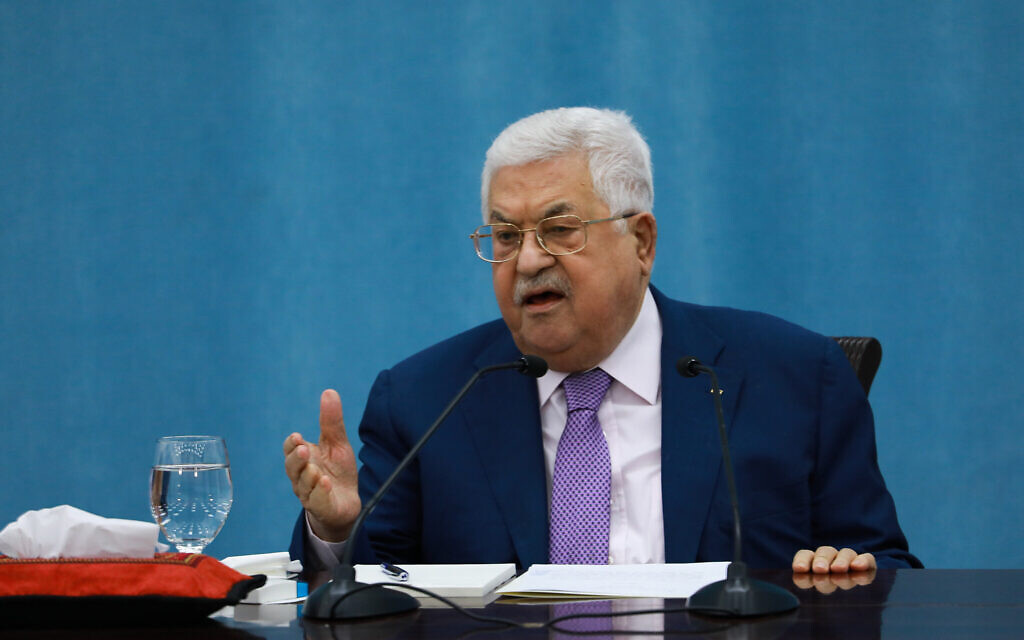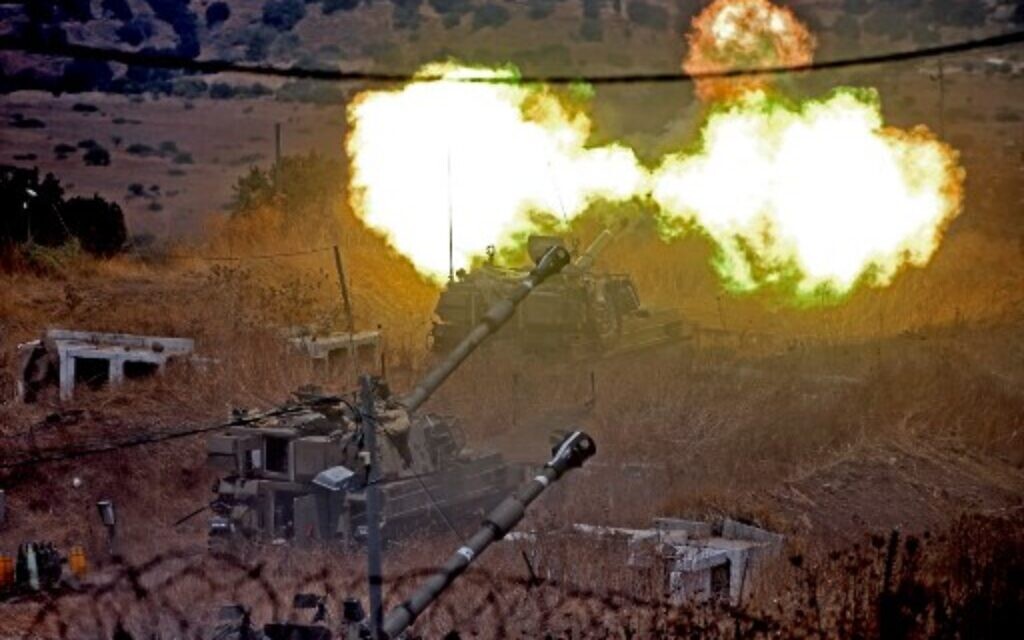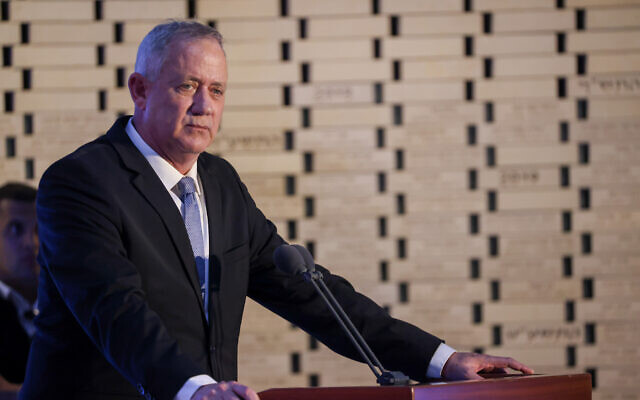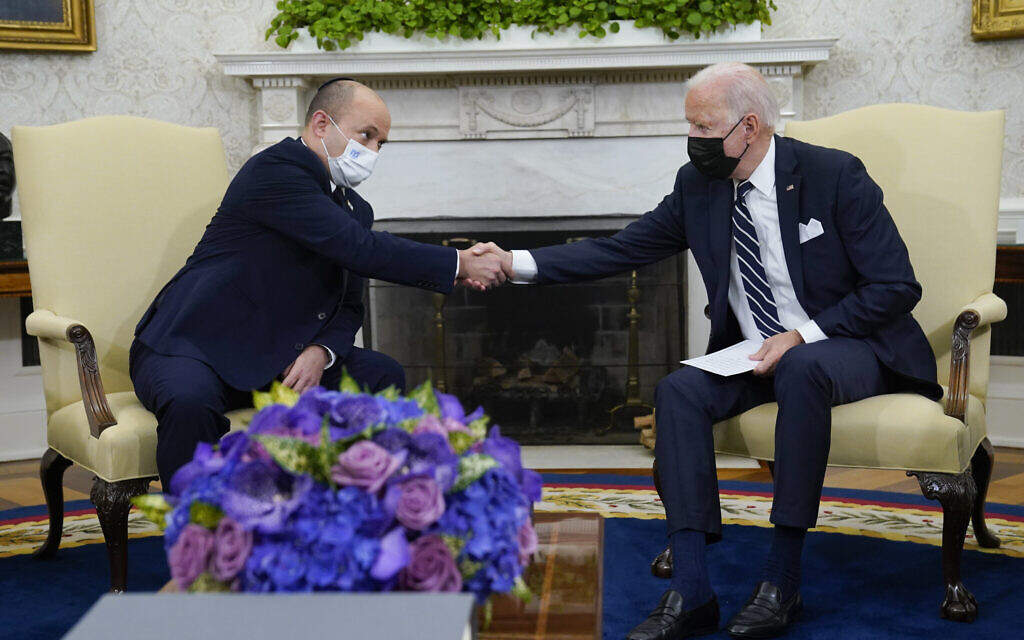US President Joe Biden (right) shakes hands with Prime Minister Naftali Bennett as they meet in the Oval Office of the White House, Friday, Aug. 27, 2021, in Washington. (AP Photo/Evan Vucci)
The defense minister made his comments during an extended briefing with reporters at the Defense Ministry’s offices in Tel Aviv’s Kirya military base, focusing on Iran along with his meeting Sunday with Palestinian Authority President Mahmoud Abbas, the lingering threats from the Gaza Strip following May’s conflict with terror groups there, the Middle East in general and the ongoing efforts by the government to pass the budget and fund the Defense Ministry’s programs.
“A defense budget allows us to rearm and allows for the operational ability that we need, alongside important social considerations. We are working to improve fortifications in the north and to build the [Lebanese border] barrier that was held up for years,” Gantz said.
Referring to recent efforts by the government to encourage ultra-Orthodox men to perform national service, the defense minister said he was working to expand this in order to get a larger majority of Israelis to enlist, warning that if this is not accomplished within the next decade, Israel will be forced to move to a professional, volunteer military.
“The goal is to get more than 70 percent of people to serve each year, when today we only have roughly 50 percent,” Gantz said.
The defense minister said he instructed the IDF to begin preparing for the possibility that it will have to continue to support the national pandemic response through the end of 2022, after initially planning to scale back the military’s involvement in these efforts following this year’s massive vaccination drive.
Strengthening the PA
Gantz reiterated his support for strengthening the Palestinian Authority, which works closely with Israel on security issues, particularly against Hamas and other terror groups in the West Bank. However, the PA is often maligned in Israel for its financial support for terrorism in the form of stipend to the families of Palestinians imprisoned in Israeli on terrorism charges or killed as they perpetrated terror attacks, as well as for its repeated efforts to gain unilateral recognition as a state in international forums such as the United Nations.
“I told Abbas that we aren’t going anywhere and that the Palestinians aren’t going anywhere. I went to the meeting in order to build confidence and preserve the interests of the State of Israel and the important ties we have with the Palestinian Authority, which I believe we need to strengthen,” Gantz said.
“As the Palestinian Authority gets stronger, Hamas gets weaker, and so long as it has greater governance, we will have more security and we will have to act less,” he added.
The defense minister did not bring up the possibility of renewed peace talks with the Palestinians, and an official close to the prime minister told reporters earlier in the day that “there is no diplomatic process with the Palestinians nor will there be.”

Palestinian president Mahmoud Abbas delivers a speech regarding the Coronavirus outbreak (COVID-19), at the Palestinian Authority headquarters, in the West Bank city of Ramallah, May 5, 2020. (Courtesy Flash90)
Regarding the Gaza Strip, which has recently seen a significant increase in violence along the border, Gantz said Israel was maintaining its policy of making full reconstruction and further development of the enclave contingent upon the release of two Israeli civilians and the remains of two fallen IDF soldiers from Hamas captivity.
The defense minister said the military would also continue to strike more forcefully than it did in the past in response to low-level violence along the border, such as the launching of balloon-borne incendiary devices.
“We said that what had been will not be again, and what had been is not what is happening now. This is in terms of the nature and strength of our retaliations, in the different mechanism through which Qatari funds are being transferred, also on civilian issues and on the dependence of reconstruction on the captives, as I said at the end of the operation,” Gantz said.
Echoing similar comments made recently by IDF chief Kohavi, the defense minister warned that Israel may be at the outset of a fresh round of fighting in Gaza, continuing the campaign from May’s 11-day conflict, known in Israel as Operation Guardian of the Walls, if the violence along the border continues.
“Our strikes in Gaza have been precise and have hit rearmament facilities that are painful for Hamas and that deny it capabilities. I cannot promise that we will not have to continue with a 12th day of Guardian of the Walls,” he said.
Gantz also noted that rocket attacks from Lebanon, which began during Operation Guardian of the Walls, appeared to be the work of Palestinian terror cells linked to Hamas.
During the fighting in Gaza, three rounds of rocket fire were launched at northern Israel, causing neither injuries nor damage. A fourth attack was launched on July 20 and a fifth on August 4 by these Palestinian cells.

Israeli self-propelled howitzers fire towards Lebanon from a position near the northern Israeli town of Kiryat Shmona following Hezbollah rocket fire from the Lebanese side of the border, on August 6, 2021. (JALAA MAREY / AFP)
“We have seen that Hamas International is trying to create an infrastructure in Lebanon,” Gantz said.
The IDF does not see these cells as a major threat, but has allocated additional intelligence resources to monitoring them. The main threat in Lebanon remains the Iran-backed Hezbollah terrorist militia.
After Israel retaliated forcefully to the August 4 attack, Hezbollah fired 19 rockets at northern Israel, the first time the organization has openly launched such an attack since the 2006 Second Lebanon War. These rocket attacks from Lebanon raised the specter of a potential two-front war in the future, in which Israel would have to fight both Hamas in Gaza and Hezbollah in Lebanon.
“The humanitarian situation in Lebanon is very worrying, but so are the rearmament efforts of Hezbollah. We are prepared for the possibility of fighting on the northern front, including a situation in which we would be fighting on northern and southern fronts,” Gantz said.
Source: https://www.timesofisrael.com/israel-and-us-working-on-plan-b-if-iran-nuke-talks-fail-gantz-says/
[D
isclaimer]














